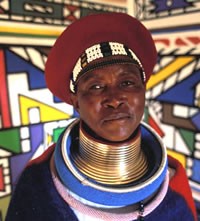Ndebele, Southern in South Africa

Photo Source:
Wally Nell
|
Send Joshua Project a map of this people group.
|
| People Name: | Ndebele, Southern |
| Country: | South Africa |
| 10/40 Window: | No |
| Population: | 1,348,000 |
| World Population: | 1,348,000 |
| Primary Language: | Ndebele (South Africa) |
| Primary Religion: | Christianity |
| Christian Adherents: | 80.00 % |
| Evangelicals: | 12.18 % |
| Scripture: | Complete Bible |
| Ministry Resources: | Yes |
| Jesus Film: | Yes |
| Audio Recordings: | Yes |
| People Cluster: | Bantu, Nguni |
| Affinity Bloc: | Sub-Saharan Peoples |
| Progress Level: |
|
Introduction / History
The Southern Ndebele, also known as AmaNdebele, are a Bantu-speaking ethnic group native to South Africa. They primarily inhabit the provinces of Mpumalanga, Gauteng, and Limpopo. Their language, isiNdebele, is part of the Nguni language family.Their origins trace back to the Bantu migrations from East Africa. Over centuries, they settled in the central highveld of South Africa, maintaining their Nguni roots despite living among Sotho-Tswana communities. The group split into two major clans—Manala and Ndzundza—following a succession dispute among the sons of Chief Musi, a pivotal figure in Ndebele history.
What Are Their Lives Like?
Southern Ndebele communities are known for their vibrant artistic expression, especially in house painting, beadwork, and dress. Their homes are often adorned with intricate geometric patterns and bright colors, symbolizing cultural identity and social status.Traditionally, they practiced subsistence farming, cattle herding, and craftwork. Today, many Ndebele people live in rural villages, though urban migration has increased. Despite modernization, they retain strong ties to their heritage through ceremonies, language, and communal life.
What Are Their Beliefs?
Southern Ndebele spirituality blends Christianity with traditional African beliefs. Many are nominally Christian, but ancestral worship remains central to their worldview. Ancestors, known as abezimu, are believed to influence health, fortune, and daily life. They are honored through rituals, sacrifices, and dreams, and are considered protectors and guides.Traditional healers play a vital role in the community, using herbal medicine and spiritual insight to treat ailments. The belief in a spiritual realm—including both benevolent and malevolent forces—shapes much of their cultural and religious practices.
What Are Their Needs?
Many rural Ndebele communities lack access to stable employment and infrastructure. For example, they usually lack adequate healthcare and schools. As a result, traditional healing is widespread.While Christianity is present, deeper discipleship and contextualized ministry are needed.
Prayer Points
Pray for spiritual revival and holistic discipleship among the Southern Ndebele.Pray that soon the Southern Ndebeles will be sending workers to parts of Africa where Christ is not yet named King of kings.Pray for economic opportunities and sustainable development in rural areas.Pray for access to quality education and healthcare.